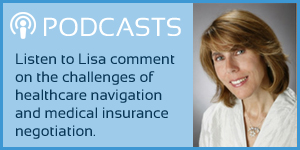Lisa’s Turn: Before Major Surgery, Think After-Care Through
- Oct
- 13
- Posted by lisaberryb
- Posted in Uncategorized
I was surprised to discover a physician advising a new client this week, who is preparing for major surgery, not to be “prematurely concerned with her after-care once released from the hospital.” His words left me astounded. Isn’t it better to plan for the worst and hope for the best instead of the other way around? Doesn’t “Better to be safe than sorry” ring a bell?
Knowing this patient has no one to rely upon after her surgery to care for her at home (which includes her bedroom on a second story, that can be reached only be climbing stairs,) as well as no reliable ride five days each week for radiation and oral chemotherapy, I felt compelled to confront the doctor. I felt my client’s safety was being jeopardized in several areas: an inability to reach her bedroom safely, no one at home to assist her immediately after her surgery, no committed driver to transport her to daily radiation and oral chemotherapy during the week, not to mention assistance with cooking, cleaning. laundry, bill paying, and medication pickup.
Working as a patient healthcare advocate, I am used to being with a client from pre-op to discharge. If necessary, I’m also available after discharge if no one is available to be consistently present with that client. It is more obvious than ever a patient and his/her advocate must prepare for satisfying the logistical requirements necessary after surgery in order to achieve the most positive outcome possible. Not only is this in the best interests of the patient, but also in the efficiency and cost operation of the healthcare institutions and providers treating any patient.
The more I hear about healthcare reform finally beginning to become available to all Americans, the more I wonder how that reform is defined. For SOUL SHERPA®, unless there’s a complete plan for surgery after-care in place, it’s not healthcare. It’s irresponsible medical care, and all the more reason each of us, regardless of how minor or major a health issue is facing us, needs to have someone by our side to make sure our plan of care makes sense and costs as few cents (we wish) as possible. To physicians who minimize a patient’s plan for after-care following surgery, I say it’s time to take a few graduate business school classes. Big money is at stake as our boomers age into seniors. Medical care needs to be as thorough as possible, from start to finish. No longer can we separate finances from healthcare; the two are now intertwined forever.
SOUL SHERPA® encourages everyone facing surgery to enlist the commitment of a friend, family member, or professional advocate to ensure their plan of after-care is complete. This makes common sense. No lapses in treatment (such as a missed appointment with the radiologist because a ride could not be arranged.) No missed medications (because the patient was sick with nausea and could not drive to the pharmacy to pick it up.) It’s obvious to SOUL SHERPA® after-care planning should be a part of every surgical patient’s plan of care. Especially if the patient’s physician disagrees.
Contact Information
- 818.512.6803
- lisaberryb@stanfordalumni.org
- Follow DependableDoc© on Twitter!
Services Cover:
- Medical
- Legal
- Financial
- Insurance
- Emotional Support






